Many people pass over Reggio in their rush to get from mainland Italy to the island of Sicily. Driving down the highway, they turn off at Villa San Giovanni for the car ferry to Messina, never giving a thought to what they might be missing just twenty minutes further along the road. What’s down there, anyway? Trust me, go the extra ten miles and visit Reggio Calabria —you’ll be glad you did.
AN HISTORICAL NOTE
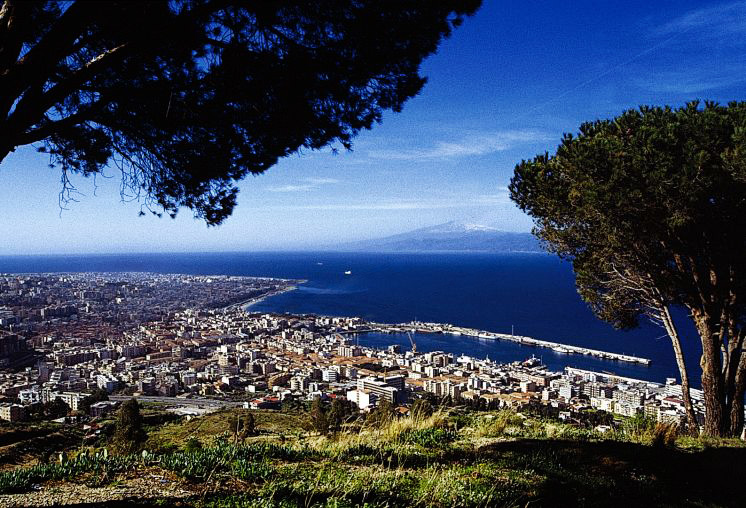
Contemporary view of Reggio Calabria with the Strait of Messina and Mt. Etna in the distance
First off, Reggio has been around forever. The “Calabria” or “di Calabria” was tacked onto the name after unification so as not to confuse it with Reggio Emilia up north. Its history predates the Greeks, who settled this strategic location at the exact center of the Mediterranean in the 8th century BC. They called their colony Rhegion, which was subsequently Latinized by the Romans and transformed through the ages under the area’s various rulers.
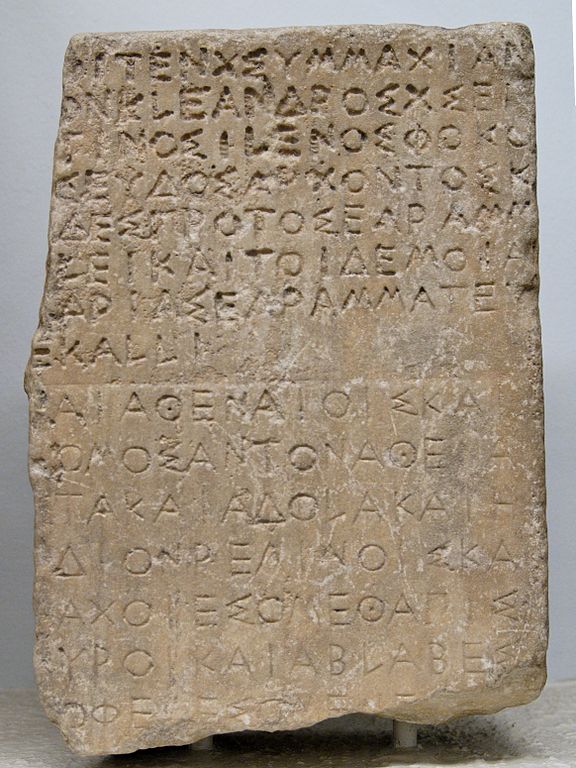
Treaty between Athens and Rhegion prior to 440 BC with a subsequent recut of the preamble when renewed with Apseudes in 433-432 BC, Collection of the British Museum
The casual visitor looking around Reggio for the first time might wonder just what happened to the old town that the good people of Reggio (the Reggini) had called home for so many epochs. The simple answer would be earthquakes, principally those of 1783 and 1908, two devastating seismic events that crushed southern Calabria and eastern Sicily. Consequently, Reggio’s architecture appears rather modern with respect to its long history.
The current population is about 180,000, the largest city in Calabria, with double the number in the greater metropolitan area.
REGGIO’S WATERFRONT
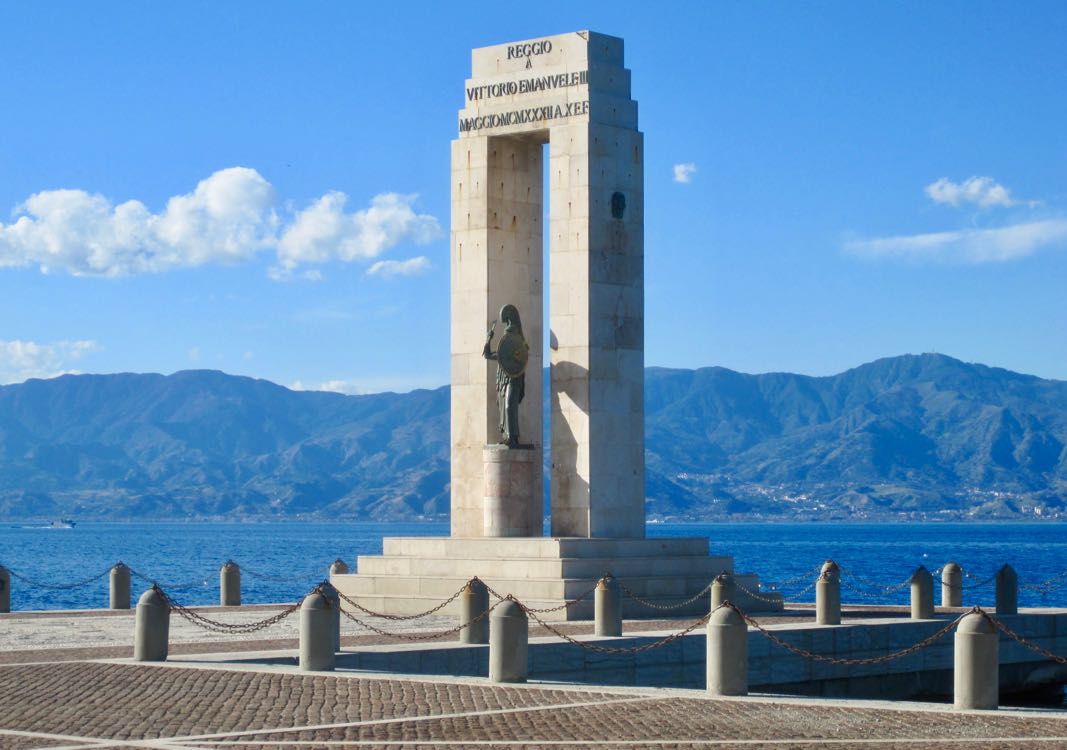
Athena Statue, an homage to Victor Emmanuel III, on Reggio Calabria’s waterfront
Nestled against the foothills of the Aspromonte Mountains, Reggio Calabria sits along the Strait of Messina at the very tip of the Italian peninsula. The lungomare or waterfront is a great place for a stroll, either down at beach level or along the upper promenade, which flanks what is commonly referred to as Via Marina, a pair of north-south coastal roads laid out in boulevard style. The approximate two-kilometer strip of land between serves as a lovely city park the length of the downtown area.
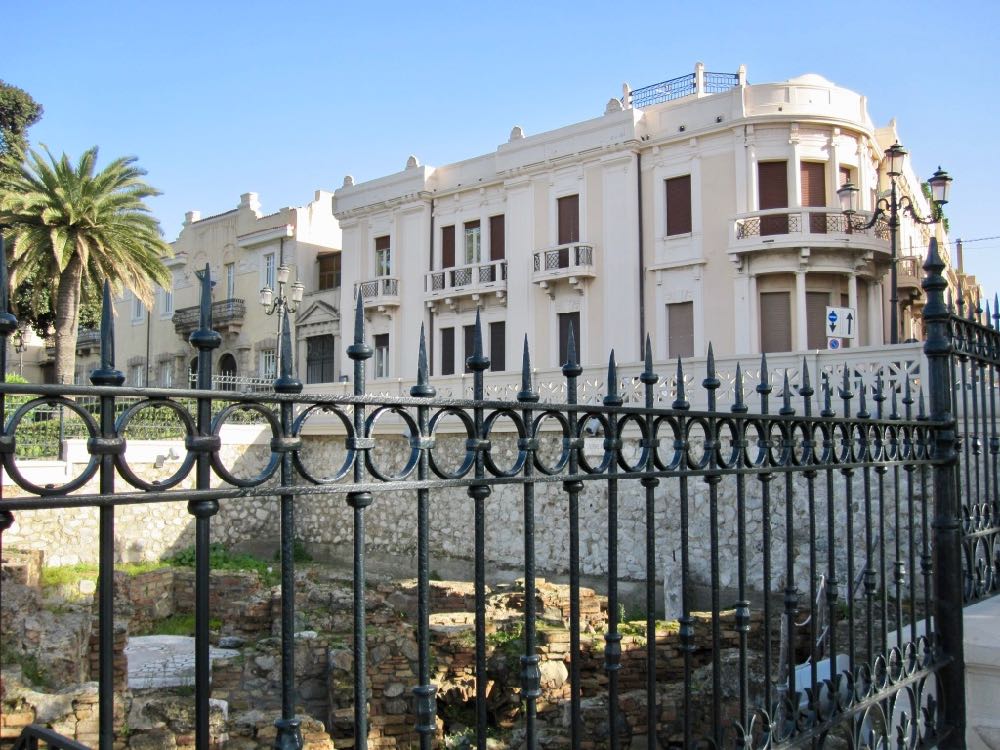
Roman ruins in front of Palazzo Pellicano (1922) on Via Marina
Stately mansions face this public garden and the strait beyond. Ruins of an ancient Greek wall and a Roman bath complex give a nod to Reggio’s past, and welcoming shade from the midday sun is provided under and amidst its many exotic plants and trees.
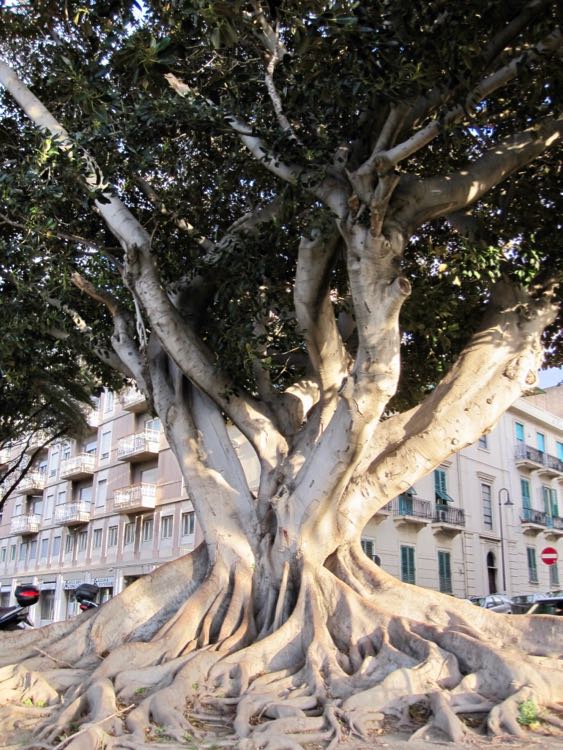
A Moreton Bay Fig, a massive-trunked, Australian evergreen with an impressive aerial root system, in the park along Via Marina
Reggio Calabria’s lungomare is not only a picturesque setting but the view across the waters of the strait—to Messina, the mountains of Sicily and on a clear day, Mt. Etna in all its glory—is truly spectacular. Italian writer Gabriele D’Annunzio is said to have proclaimed Reggio’s waterfront, “il più bel chilometro d’Italia” or the most beautiful kilometer of Italy!
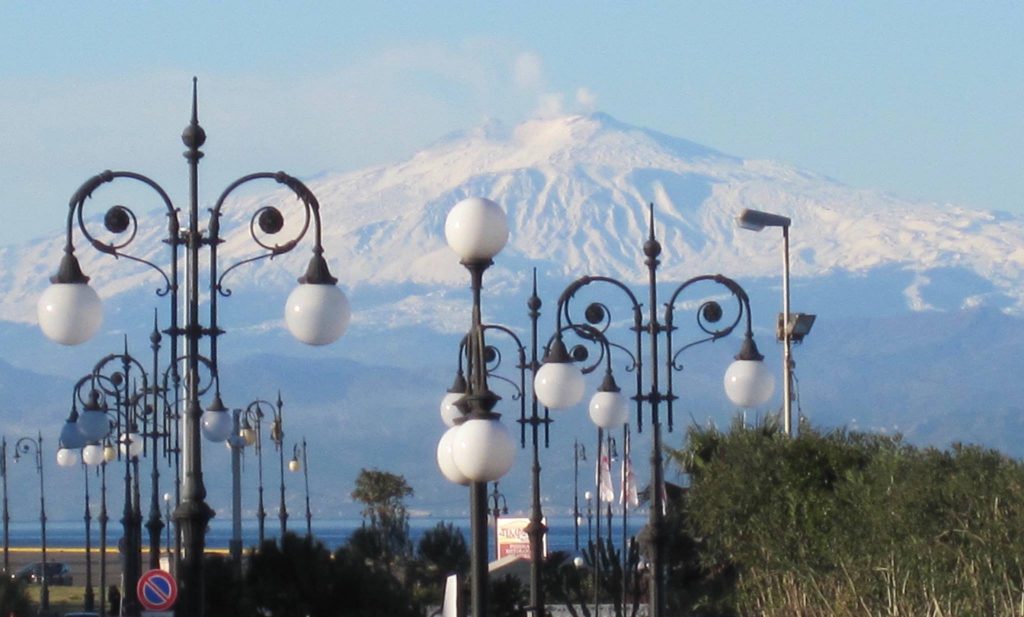
Mt. Etna, the volcano as seen from Reggio Calabria’s waterfront
REGGIO’S HISTORIC CENTER
After the 1908 earthquake, the downtown was completely rebuilt. The city’s website characterizes the architectural style as being “between eclecticism and Liberty,” which is Italy’s art nouveau, a style for which Reggio is noted. Despite the building variety, with many instances of Neoclassicism, other period reinterpretations and a significant percentage of late art nouveau, the overall appearance is rather uniform with an air of genteel sophistication.
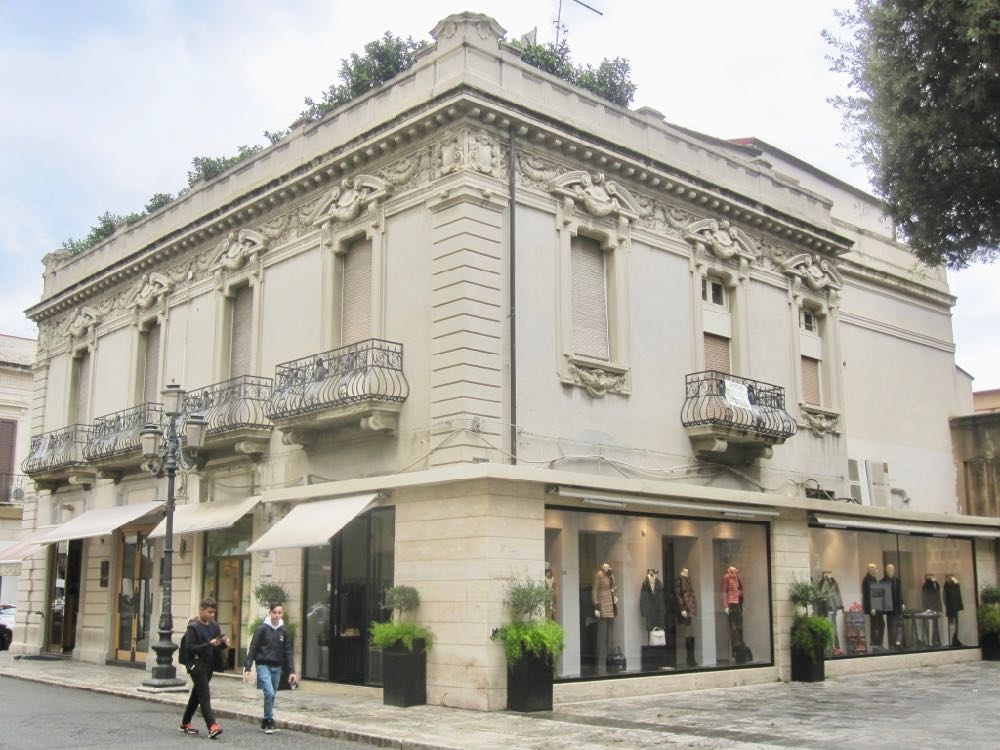
On Corso Garibaldi in Reggio Calabria
Corso Garibaldi, the pedestrian-only street lined with tony shops displaying their wares in the ground-floor windows of impressive edifices, runs parallel to Via Marina. The Reggini saunter up and down this attractive thoroughfare as they engage in Italy’s beloved passeggiata. This leisurely walking is so popular in Reggio that pedestrian traffic-jams form during peak meandering times. The passeggiata is a pastime for all ages and young people come out in droves on Saturday night.
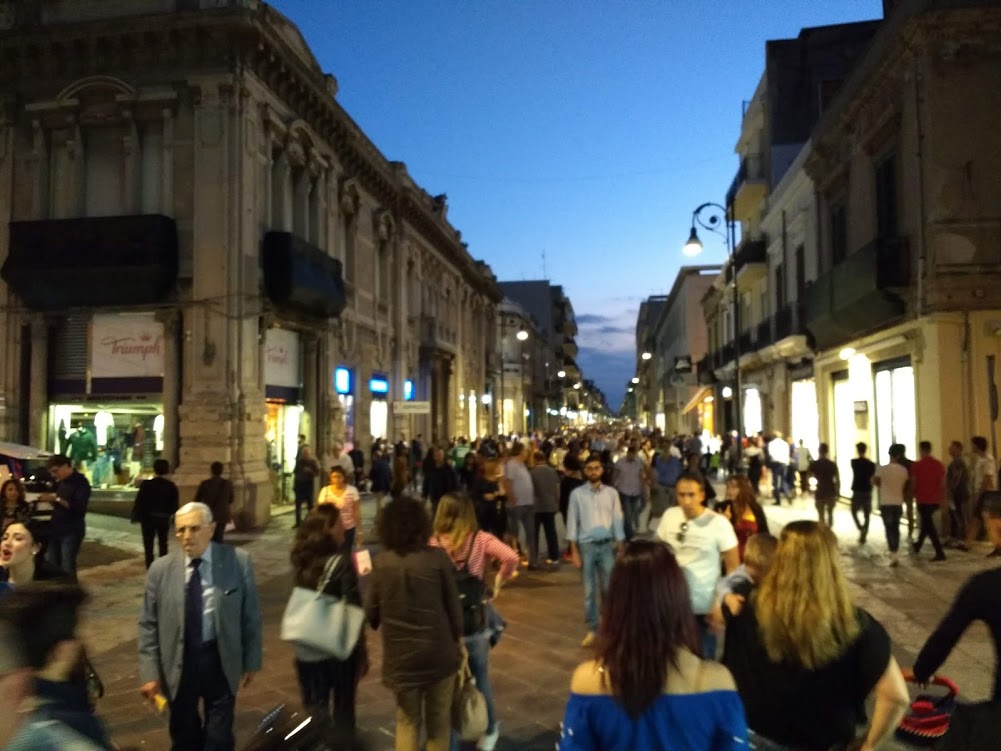
A Sunday evening passeggiata on Corso Garibaldi in Reggio Calabria
Piazza Italia sits at the center of Corso Garibaldi, or il Corso as the avenue is called. This important square, the seat of today’s municipal government, prefecture and provincial administration, amazingly served as the agora or central public space for the ancient Greeks as well as the forum in Roman times. Recent archeological excavations have revealed six stratifications within a 6-meter (20-feet) depth: Hellenistic Greek, Imperial Roman, Byzantine, Norman, Angevin and the nineteenth century. The visitor can look through glass to see the ancient street below or if lucky and it’s open, descend to the lower level.
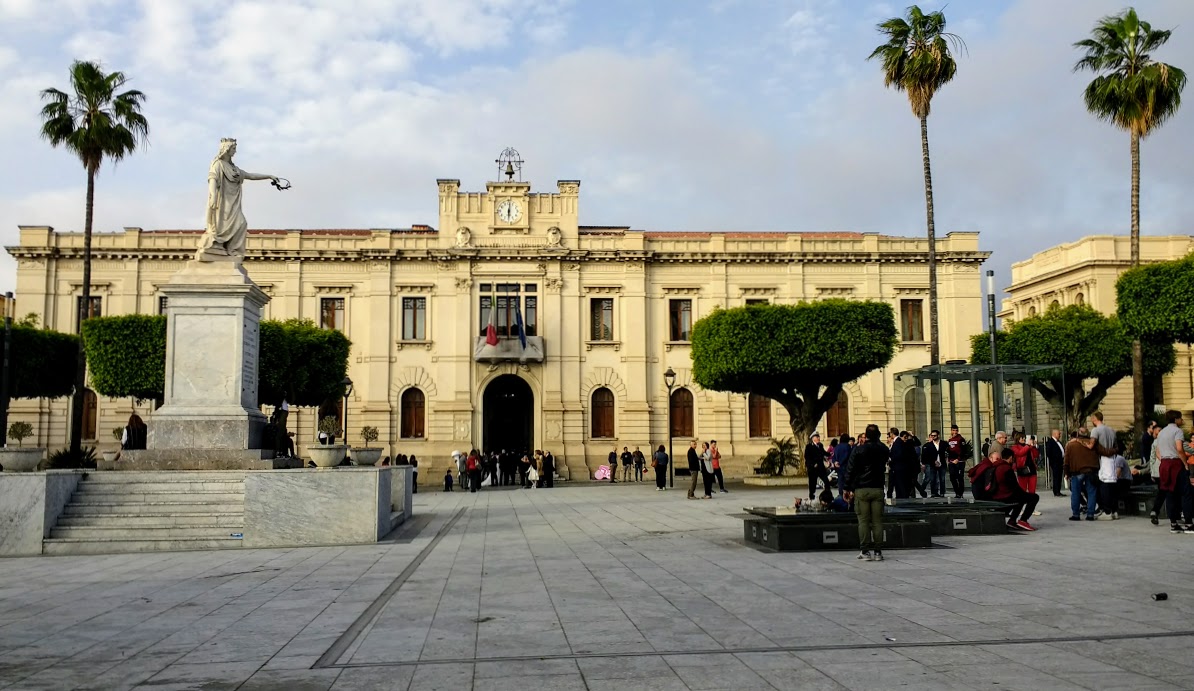
Piazza Italia with “Liberty” style Palazzo San Giorgio (1918-1921), the seat of the city government
An exhaustive study of the buildings in Reggio’s historic center would fill many pages. I can only entice with a few details.
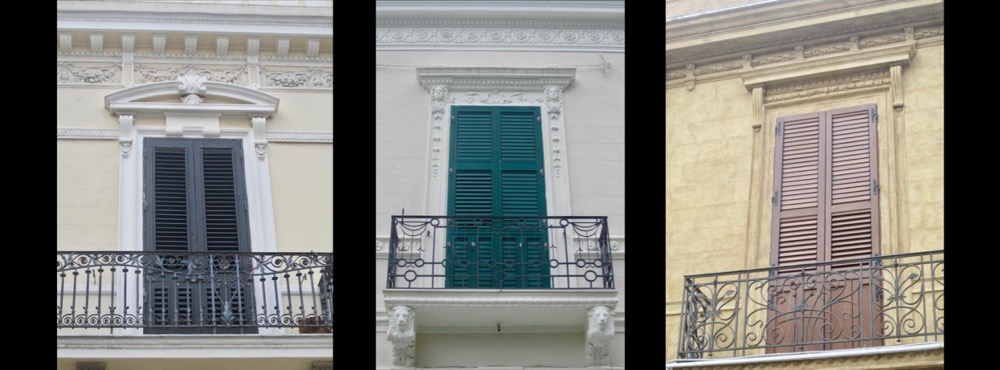
Architectural details of Reggio Calabria
REGGIO’S THEATERS, CHURCHES AND CASTLE
The two theaters on il Corso are well worth a look. The classic 1,500-seat Teatro Francesco Cilea sits catty-cornered to Piazza Italia. Dedicated to the Calabrian opera composer, the theater produces a series of performances in its lovely 18th-century style interior. The Politeama Siracusa charms with its art-nouveau curvilinear motifs and appealing wrought iron work, but unfortunately is rarely open.
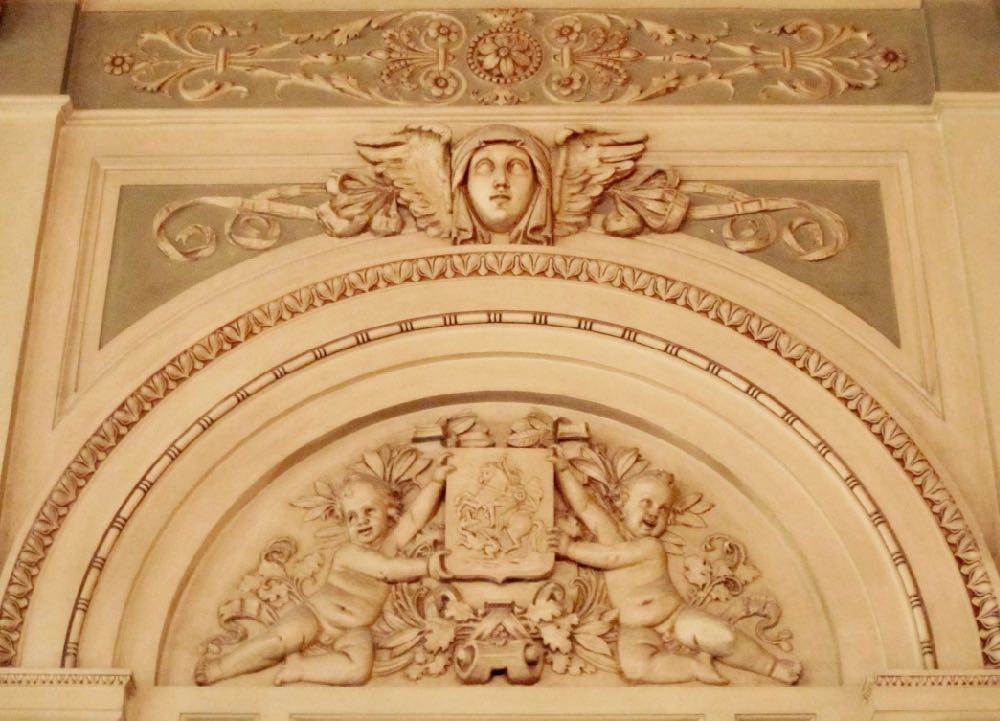
Interior detail of Teatro Francesco Cilea
As all over Italy, churches aren’t difficult to find. Reggio’s cathedral sits on the southern end of il Corso and faces a large, newly renovated piazza. Officially called the Basilica Cattedrale Metropolitana di Maria Santissima Assunta in Cielo, the church was rebuilt in Romanesque Revival style following the 1908 earthquake and re-consecrated in 1928 almost one thousand years after its establishment. The marble Baroque chapel that was rescued from the previous structure is not to be missed off the left aisle. The Cathedral has been a focal point of Reggio’s Festival of the Madonna, one of Calabria’s biggest celebrations, for over 500 years.
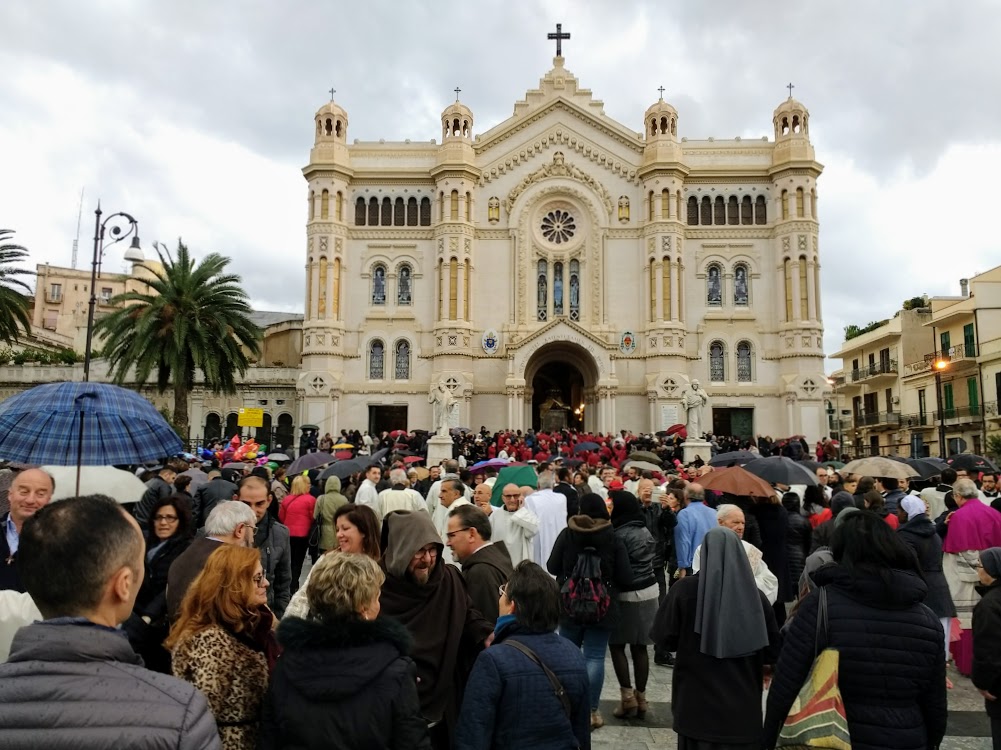
Anticipating the Procession of the Madonna from Reggio Calabria’s Cathedral
Amongst Reggio’s many beautiful churches, the shimmering sanctuary of the Church of San Paolo alla Rotonda stands out. Many of the interior mosaics are the work of Calabrian artist Nunzio Bava. The church is located near the Palazzo della Cultura on Via Reggio Campi in an elevated position from where there is an excellent view over the city. Back in the center of town near the castle, the Church of the Ottimati features a geometric mosaic flooring from the Byzantine period despite the present structure’s relatively new construction.
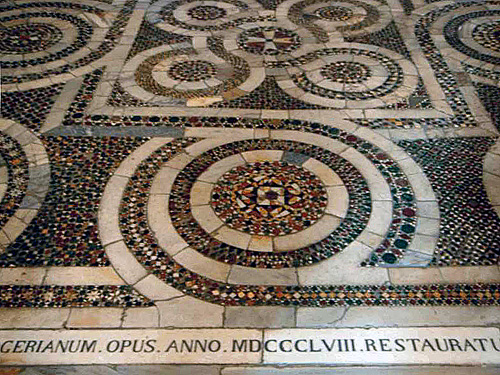
Byzantine mosaic floor in the Church of the Ottimati
Reggio Calabria’s majestic Castello Aragonese (Aragon Castle) survived the 1908 earthquake intact, but much of the structure was subsequently knocked down in the name of city planning. Despite its size, the castle, just two streets up from il Corso, seemingly hides outside of a block’s range, when the impressive edifice suddenly looms above with its formidable cylindrical towers. Today, the castle serves as an exhibition space.
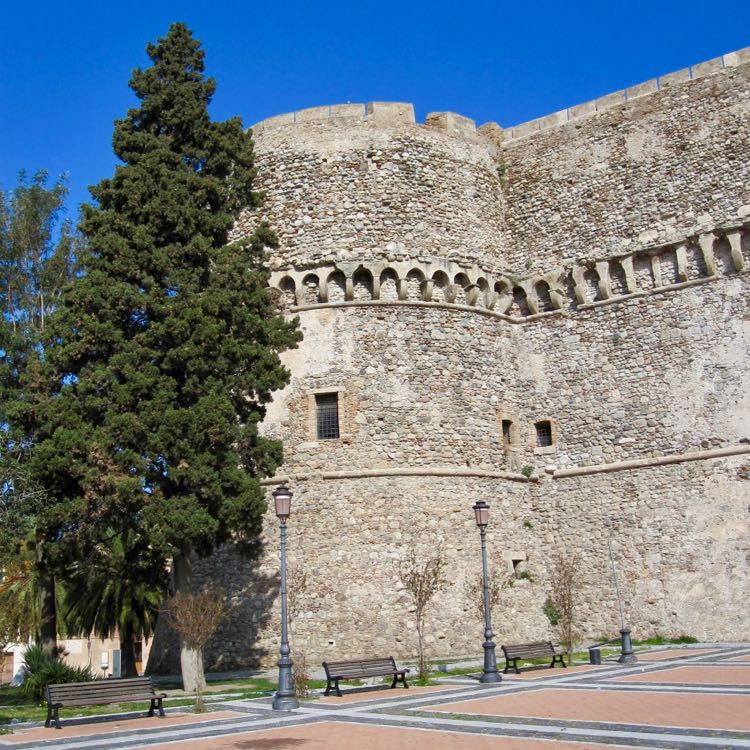
Aragon Castle in Reggio Calabria
VISIT REGGIO CALABRIA MUSEUMS
A visit to Reggio wouldn’t be complete without examining the wealth of ancient artifacts at the world-class archeological museum. In fact, many people fly in just to see the famous Riace Bronzes, 2,500-year-old Greek statues of impeccable artistry. However, even without these giants of antiquity, the archeological museum in Reggio Calabria would be a must-see. It’s at the north end of il Corso facing Piazza De Nava.
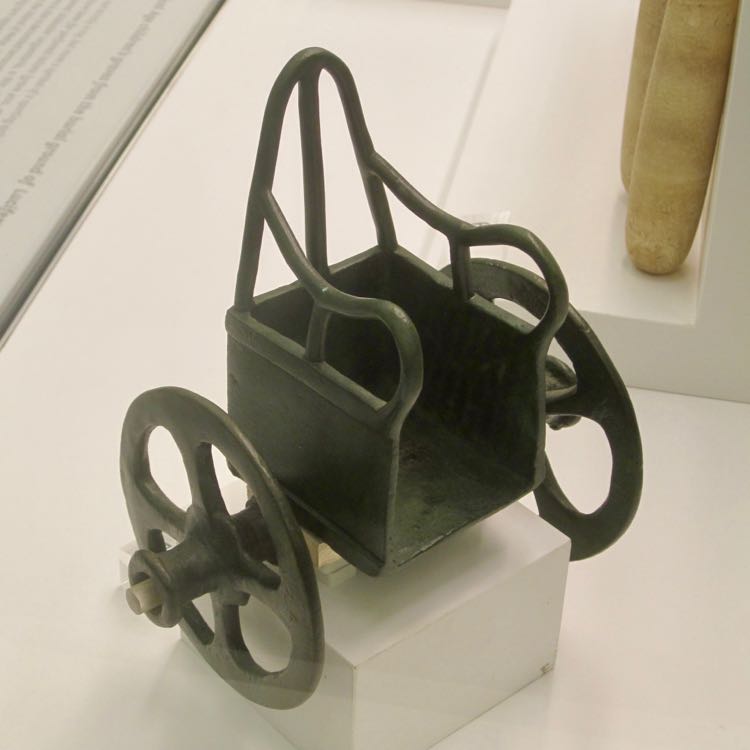
When you visit Reggio Calabria, your miniature bronze chariot awaits (425-400 BC) at the Archeological Museum
Inside Teatro Cilea at the center of il Corso, the Pinacoteca Civica or the Civic Art Museum of Reggio Calabria is an interesting art space with numerous paintings by Calabrian artists in elegant rooms of the theater building. The Palazzo della Cultura is another museum that features local artists as well as art confiscated from a ‘Ndrangheta mafia boss. The Museo San Paolo, housed in the same palazzo up a hill from the castle, has a very nice collection, an eclectic mix of icons, paintings, sculpture, silver and books. If that weren’t enough, the cathedral displays a collection of sacred objects in their Museo Dicesano and Reggio also has a Musical Instrument Museum, set up in the city’s old Lido train station in a little pine grove, a bit further north from the new one. And for a unique museum experience, visit the city’s Bergamot Museum.
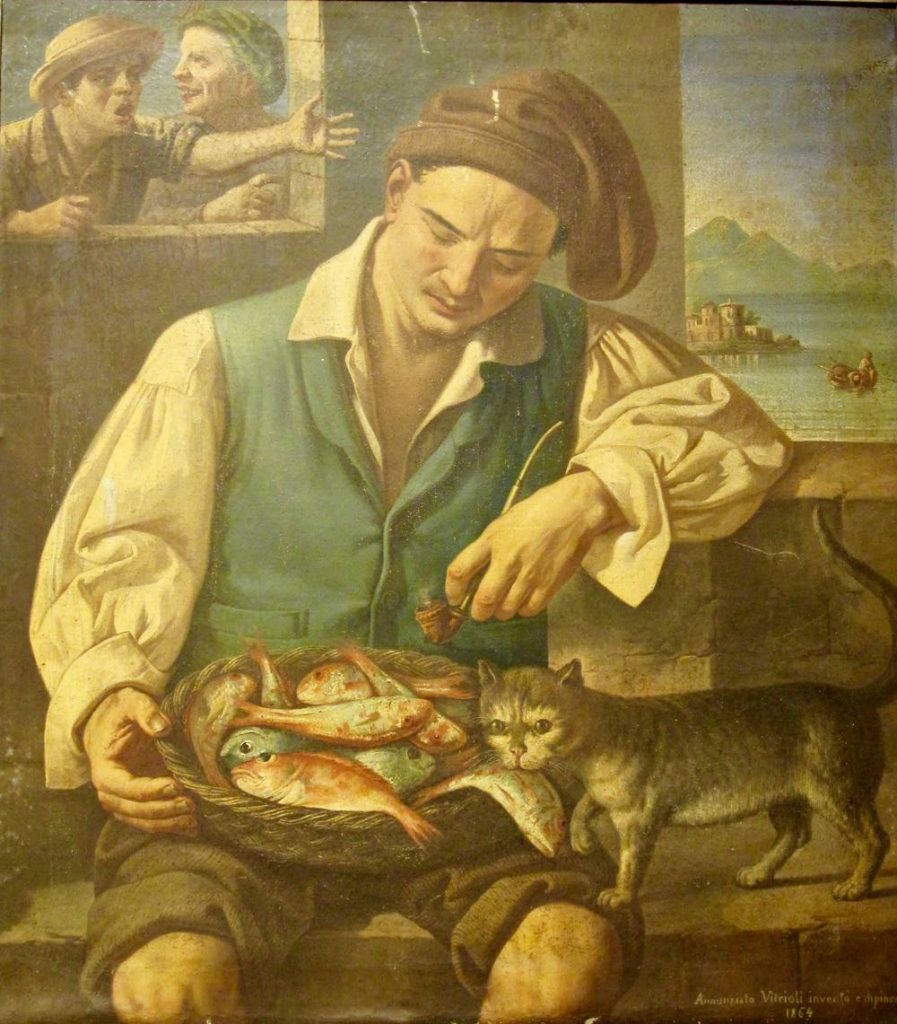
Marinaio con pesci (Sailor with Fish) by Annunziato Vitriolo (1830-1900), oil on canvas, Pinacoteca Civica, Reggio Calabria
THINGS TO DO IN REGGIO CALABRIA
Are you still looking for things to do in Reggio Calabria? How about shopping, eating or going to the beach? In the summer, the seaside is lined with rows of lounge chairs, umbrellas, bars, clubs and restaurants of seasonal concessionaires.
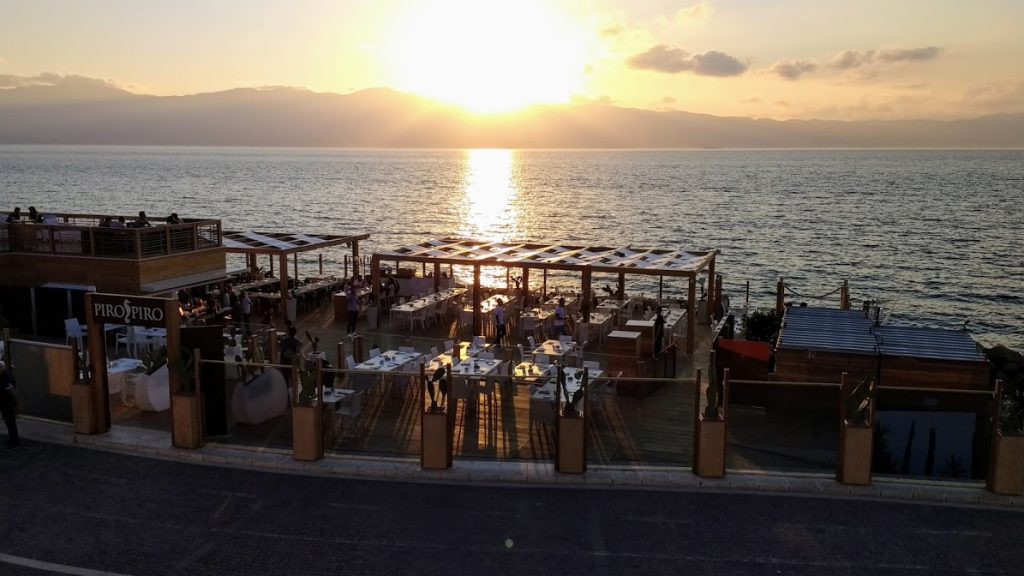
Ready for a sunset dinner on Reggio Calabria’s waterfront looking out over the Strait of Messina
The shopping choices are quite extensive, everything from high-end designer boutiques to general department stores. When you visit Reggio Calabria, you can pick up a specialty food item from the area or a bauble made by Calabria’s master jeweler Gerardo Sacco.
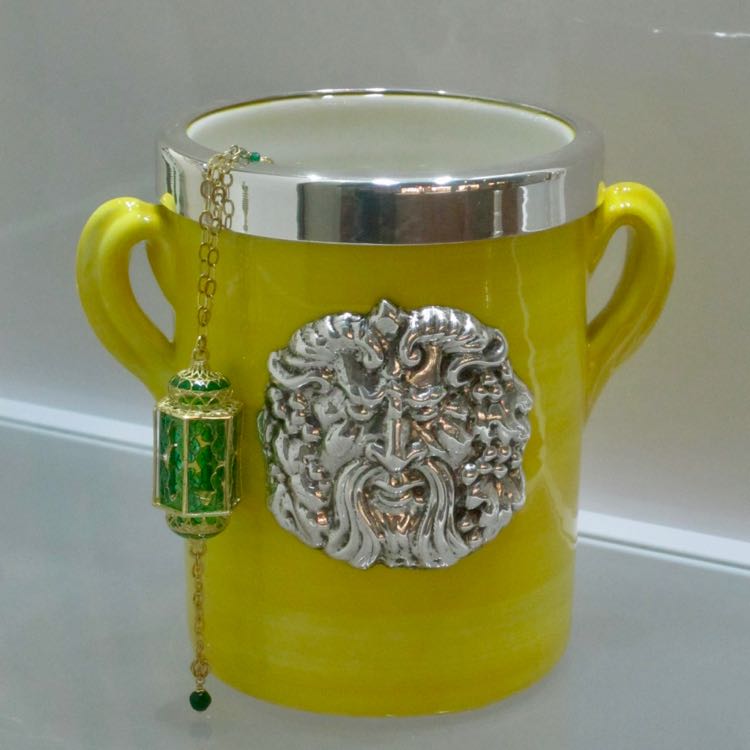
Window shopping at Gerardo Sacco on Corso Garibaldi
And make sure to stop in a bar of which there are many, all with gleaming, state-of-the-art coffee machines. Rub elbows with a local and remember that the Italian bar is not only home to Italy’s quintessential “espresso,” but a wide selection of beverages and delectable pastries, as well. Taste a delicious dessert or beverage made from the bergamot. After all, one of Reggio’s nicknames is the Città del Bergamotto.
A cone, dish or brioche filled with gelato will fortify a passeggiata, and Via Marina boasts two gelaterie that are local institutions, Cesare and Sotto Zero. There’s so much to see and do in Reggio Calabria, dinner will have to wait.
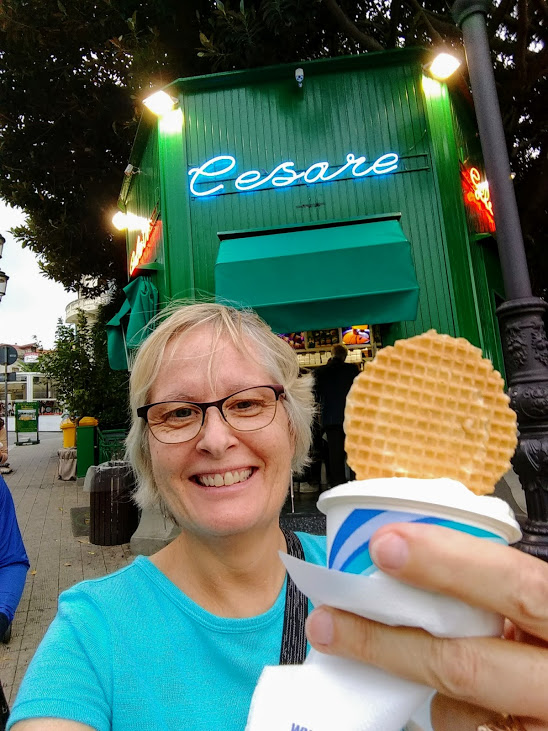
The author at Cesare Gelateria in Reggio Calabria
 Are you ready to visit Reggio Calabria? Join my Calabria tour! And read more about Reggio and the fascinating region in the toe of the boot on the above links and in Calabria: The Other Italy, my non-fiction book about daily life, history, culture, art, food and society in this important area of South Italy. It’s available in paperback and e-book versions.
Are you ready to visit Reggio Calabria? Join my Calabria tour! And read more about Reggio and the fascinating region in the toe of the boot on the above links and in Calabria: The Other Italy, my non-fiction book about daily life, history, culture, art, food and society in this important area of South Italy. It’s available in paperback and e-book versions.
“Like” Calabria: The Other Italy’s Facebook page and follow me on Karen’s Instagram and Karen’s Twitter for more beautiful pictures and information.
Visit Reggio Calabria virtually and sign up below to receive the next blog post directly to your email for free.


Comments 30
Everybody with an interest in history, nature, art, geography, archaeology will find an answer to many questions, visiting or walking along the streets of Reggio Calabria. It is not just a walk in the streets it is a jump back in the past.
Author
Absolutely, historical perspective.
My grandfather Francesco Antonio Arena was born in Reggio. He migrated to New York and became a stone carver. He moved to Bedford. Indiana in 1908 , bringing his family, and established a stone carving studio where my father Frank Arena. Jr. apprenticed. I recall my father telling how his relatives in Italy were killed in the 1908 earthquake, and that they shipped 4 barrels of olive oil to my grandfather as his share of the estate. Stanley Tucci’s grandfather, Julius Tucci was my dad’s first cousin. I enjoyed Stanley’s series on Italy.
Author
Interesting story. Reading that your father was a stone carver in Indiana, I immediately made an association with the stone quarry in the 1970s film Breaking Away about the cutters and cyclists. I think I saw the movie 30 years ago. So many people were killed in the 1908 earthquake. My friend Luisa also has a story in her family about how her grandmother was saved by happenstance as she normally slept in a crib, but fate had her parents taking her into their bed that night. Then of others, who like yourself, one member of the family was far away and they lost all of their relatives in one day. A couple of months ago, I got a call from one of the producers of Stanley Tucci’s Italy series, knowing of my book and blog, and asking many questions about the region. Apparently, they are planning on featuring Calabria in one of next season’s episodes.
Can you tell me where I go to find records for when my grandparents lived there?
Author
Records of birth, marriage and death are held in the town hall, so you need to know your grandparents’ specific place of origin, whether it be the city itself or a village in the Province of Reggio Calabria.
Perfect timing! We booked our first trip to Calabria (21st to Italy) and are flying in and out of Reggio, with two weeks in between to explore the region. I also have your book which, combined with this and other posts, gives us so much helpful information.
Author
Wow, you’ve surely seen a lot of Italy in so many trips. Glad that you’re finally getting to see Calabria and that my book and blog have been helpful for you. Enjoy your time in the toe!
Your enthusiasm and passion for Calabria is so infectious Karen. You make one want to visit every town and city that you write about and explore the culture and gastronomy that you cover in your posts. Auguri. Michele
Author
Thank you. It’s an exploration with always something new in sight – Buon viaggio!
Hi Karen, I was wondering if you could provide info on the best way to visit this gorgeous place. I will love to visit. Please let me know
Author
Reggio has an airport (code REG) as well as a couple of train stations, and is a half-hour ride on a hydrofoil from Messina in Sicily. You can explore the city on your own or join me on a Calabria tour with Karen’s Travel LLC and visit Reggio as well as the entire region!
It ALL sounds (and looks) so lovely, Karen. I envy the people who will accompany you, on your trip !!
BUON VIAGGIO !!!
Author
Glad you liked the post. Reggio Calabria is a very underrated city and I’m sure will be greatly enjoyed by my tour participants. Grazie.
Hi Karen, I live in Calabria some months of the year, and from the moment I made my second land I have been attracted by the history of this place in Italy, I read your book with great enthusiasm and I laughed a lot in the things that I felt very identified, with my wife we spent the summer there and we would like to invite you a coffee some day in Scilla.
Author
Thank you, Mario, that would be very nice. I will look you up when there in the warmer months. How wonderful to have a home in Scilla! It makes me very happy to hear that you enjoyed my book. Thanks for stopping by my blog.
That view of the Etna from the lungomare is breathtaking!
Great article, lots of useful info, as usual! I’ve yet to read your book (!!!), but after I left for South Tyrol I had to read books only in German in order to practice! Now it’s the time to read it! Looking forward to discover more about Calabria through your point of view ❤👌
Sara
Author
Thanks! I completely understand the language thing. I’ve gone on long stretches in which I’ve only read in either Italian or German to try and get a handle on them. And very early on, it was almost like doing a puzzle. Then I would go back to English and be amazed at how easy it was!
Reggio Calabria looks lovely, but Calabria had me at the Riace bronzi! I really need to go see those guys! Calabria is one of the possibilities for the 2020 AICW Conference. We should be finding out soon. Ciao, Cristina
Author
You wouldn’t be the first to be hooked by the Bronzi! Wow, that would be interesting, a bunch of Canadian writers descending on Calabria. It would certainly give them a lot to write about!
Nicely done Karen. We must investigate the “big toe” someday soon.
Author
Thanks, Tom. I like the “big” – I might use that.
You’ve picked out some really fascinating items from the museums in Reggio, but what is that bejeweled concoction from Gerardo Sacco? Merely decorative or also functional?
Author
Good question. I liked the yellow color and the mythological silver face, and the fact that there wasn’t glare on that spot of the window. I don’t know if it was made for drinking, but it would look good on a desk with pencils or on a table with breadsticks coming out of the top. I don’t think the green jewel was attached. So I’m going with: definitely decorative with strong possibilities of functional.
Beautiful article. My mother was 8 yrs old and never forgot the Earthquake and her fear of storms. Thank you for posting.
Author
I have a friend who tells the story of her mother who was an infant during the time of the big earthquake. For some unexplainable reason on the eve of the event, her grandmother felt the need to take the baby into bed with her. The crib did not survive the earthquake. It’s no wonder that these are a religious people. Thank you for your comment.
Great blog. Love the history and the photos. You make Calabria seem so appealing! Another for my bucket list when I can travel to Italy again.
Author
Thanks! There is so much of interest in Calabria. My book and blog have turned into a life work!
Karen I find your writing so interesting. Living in Australia makes us more remote but as a person born in calabria I love reading this information. I would love to join you on a tour although the times and timing are a challenge. I have been to calabria many times but it seems your perspective provides a fresh look
Author
Glad you enjoy my writing, and high praise from someone born in Calabria and who has returned many times. I would love to have you on one of my tours. We had a Canadian, who was born in Calabria and who spent many summers there as she was growing up, on my first tour, and not only did she make a great contribution to the group, I think that on some level, she may have enjoyed the program the most. And we also had an Australian, but she lived in the US. As you say, Australia is so far away, and your recent isolation must make you feel even further away, but I will send you some information privately in the hopes for the future. And on the eve of the new year, here’s to better times in 2022!